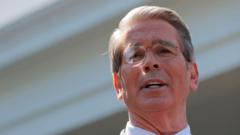As the war in Ukraine persists, President Volodymyr Zelensky stands at a crossroads, having evolved remarkably from a comedian to a wartime leader. His transition was catalyzed in 2022 when he chose to remain in Kyiv, rallying support and aid in Ukraine’s intense fight against Russian aggression. Dubbed "the best salesman in history" by Donald Trump, Zelensky has leveraged his charisma to maintain international focus on Ukraine's plight.
Zelensky's Next Transformation: Navigating New Political Waters Amidst Ongoing Conflict

Zelensky's Next Transformation: Navigating New Political Waters Amidst Ongoing Conflict
In the complex landscape of international diplomacy, Zelensky faces a pivotal moment as he adapts to shifting global dynamics and domestic pressures.
However, with the fickle nature of U.S. politics and increasing skepticism about ongoing support, Zelensky must navigate a delicate balance between demanding military assistance and fostering diplomatic relations. His initial effectiveness lay in a direct and assertive approach, but the tides have shifted since his successes started to wane. Experts have noted that his diplomatic messaging has failed to evolve with the changing political landscape in the U.S., where a faction of the Republican party has begun questioning the efficacy of continued backing for Ukraine.
Adding to the complexity, a recent high-stakes meeting between Zelensky and Trump revealed significant tension, suggesting that while they share the goal of ending the conflict, their chemistry remains strained. Past encounters have been marred by misunderstandings, and both leaders' approaches differ significantly.
Despite facing criticism and the challenges of maintaining international alliances, Zelensky’s popularity within Ukraine remains high, especially following confrontational international meetings. This national support underscores the perception of Zelensky as a unifying figure, essential for Ukraine’s resilience.
Looking ahead, Zelensky finds himself needing to adapt once again, potentially adopting a more conciliatory approach while upholding Ukraine's bold aspirations. Observers remain divided on whether he can undertake this transformation effectively, with some predicting a possible retreat from frontline politics or a renewed commitment fueled by the challenge of the ongoing war.
As the situation evolves, it will be crucial for Ukraine's leadership to not only advocate for military aid but also articulate a viable path toward peace, ensuring they remain resilient on the global stage. While the coming months are fraught with uncertainty, one fact is clear: the art of diplomacy may become Zelensky's most vital skill yet.
Adding to the complexity, a recent high-stakes meeting between Zelensky and Trump revealed significant tension, suggesting that while they share the goal of ending the conflict, their chemistry remains strained. Past encounters have been marred by misunderstandings, and both leaders' approaches differ significantly.
Despite facing criticism and the challenges of maintaining international alliances, Zelensky’s popularity within Ukraine remains high, especially following confrontational international meetings. This national support underscores the perception of Zelensky as a unifying figure, essential for Ukraine’s resilience.
Looking ahead, Zelensky finds himself needing to adapt once again, potentially adopting a more conciliatory approach while upholding Ukraine's bold aspirations. Observers remain divided on whether he can undertake this transformation effectively, with some predicting a possible retreat from frontline politics or a renewed commitment fueled by the challenge of the ongoing war.
As the situation evolves, it will be crucial for Ukraine's leadership to not only advocate for military aid but also articulate a viable path toward peace, ensuring they remain resilient on the global stage. While the coming months are fraught with uncertainty, one fact is clear: the art of diplomacy may become Zelensky's most vital skill yet.






















